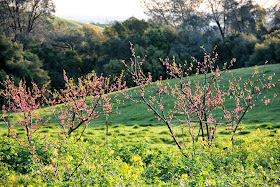 |
| This March our hills look more like late April conditions |
 |
| Peaches in full bloom, early March |
 |
| Our BCS sickle bar mower |
Lacking significantly more spring rain we will be facing hard choice #2: stripping off all young fruit to reduce stress on the trees and give them the best chance of surviving the fourth dry year in a row. It's a drastic step and one we hope we don't have to take. But we have to think of the long term health of the trees. All the juice, sugar and fiber in fruit comes from the stored energy in the tree's roots and from the current season's photosynthesis, and both depend upon water uptake through the roots. But those same energy sources also maintain the growth and health of the tree itself. So when trees are drought stressed, fruit production actually competes with tree health. We considered taking this drastic step last year but decided instead to leave the fruit on and dole out our meager water resources to the trees as efficiently as possible. The harvest was good but the trees were badly stressed in late summer. So if this turns into the fourth year of drought we will sacrifice the harvest in hopes of helping to relieve some stress on the trees this summer.
Scaling back our home garden was another unhappy choice. A nice February rain storm encouraged us to risk small spring plantings of carrots, cabbage, broccoli, onions and potatoes. Normally we would do succession plantings for continuous harvest through early summer, then transition to tomatoes and other summer crops. But we'll not be planting anything more this year. As it is we are already having to irrigate our winter vegetables when they would ordinarily get by fine on spring rains. And tomorrow I will begin doling out water to the orchard trees so there will be even less to spare on the garden.
 |
| Small carrots under row cover cloth, protected from birds and wind |
 |
| Our garden onion plot is scaled back to half size |
But enough doom and gloom. We'll get through summer and pin our hopes on next rainfall season to break the drought. Meanwhile we feel privileged to enjoy sights like this double rainbow that appeared a few weeks ago.

Seriously scary, Bill and Fern. I think of you often. The Corvallis area had unusually sunny and warm weather in March, but now is back to cool and rainy. Plums bloomed about three weeks early. Pears are just finishing blooming, and apples are beginning. I planted two apricot trees, which normally have a hard time making a crop due to late spring frosts. I'm guessing that if we keep getting warmer and earlier blooming those trees may do better than expected. If only some people could make some desalination breakthroughs so the technology could achieve some scale!
ReplyDeleteSincerely, Susan Kline
It's a very informative post,.
ReplyDeleteThanks for sharing with us,
buy chainsaws